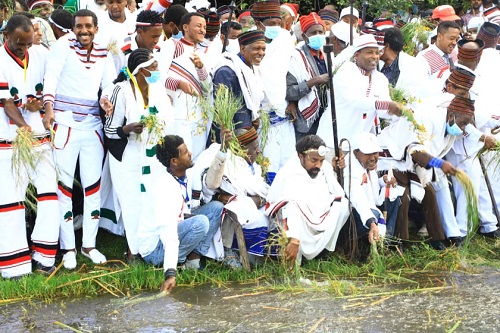
COMPILED BY LEULSEGED WORKU
Irreechaa is one of the institutions in the Oromo Gada system in which the Oromo identity is conceived and developed to its present statuesque. Apart from its thanksgiving and praying role, it is the social mechanism by which intergroup and intragroup peace is built and restored.
From historical perspectives, Irreechaa is understood within the context of Oromo religion/Waaqeffannaa, a belief in one super natural power called Waaqaa /God/. However, Irreechaa has undergone some changes and evolutions in accommodating non-religious aspects in the context of Oromo culture and has become the arena for articulation of Oromo identity, unity and peace rather than mere practice of thanksgiving. Today, Irreechaa brings together everyone from all walks of life irrespective of the religious differences and national origins.
The Philosophical and Legal Bases of Irreechaa Ritual As Catherin Bill maintained, the rite is characterized by formalism, traditionalism, rule governance, sacral symbolism and performance. This concepts coincide with Oromo world view, Waaqeffannaa, Oromo religion (which is being manifested on the occasion of Irreechaa), symbolic material objects (Bokkuu/scepter, Siinqee-Women’s ritual stick, cultural objects and costumes on Irreechaa celebration), ordain of Gadaa officials and Abbaa Malkaa and Foollee jubilant procession on the celebration.
The rite of the past and present societies of Oromo’s are accompanied with special gesture and words, performance of special music’s, songs, dances, procession and manipulation of objects and use of special cultural dresses, consumption of special food and drinks. In fact, the Oromo celebrates Irreechaa as a sign of rewarding Waaqaa /God/ in the form of thanks and praise for what they have been given and also pray for what they expect in the upcoming future.
Although some outsiders consider Oromo as idolaters, the truth is that the Oromo have chosen river banks and hill tops as guided by their worldview of nature that green symbolizes fertility, peace and abundance of rain. Hence the season in which Irreeha Malkaa takes place is considered as the heralding of hope and prosperity.
One very important philosophical concept that should be plain and noted about Irreechaa is, the role of spirit. The Oromo believe that every creation of Waaqaa /God/ has its own spirit. For Oromo Waaqaa /God/is said to be omnipotent and omnipresent and is believed to govern all its creatures by surging over the sea (in the form of spirit) and the great rivers. Furthermore, the hilltop is believed to be holly in nature and an abode of the spirit. Thus, these outlooks are found interwoven with cultural ethos of Oromo People. Hence, Oromo ethics, moral values and social practices in Gada system are integrated in philosophical base of Irreechaa.
According to the legal and philosophical assumptions of the Oromo, there are six basic natural laws, known as ‘Heera Ja’an Waaqayyoo’ in the Oromo vernacular. These are: Laws of God (Seera Waaqaa), Law of Earth (Seera Lafaa/Dachee), and Law of Hill-top (Seera Tulluu), Law of River (Seera Malkaa), Seera Abbaa (Law of Father) and Law of Mother (Seera Haadhaa). These laws are eternal, neither changed nor abrogated.
According to oral traditions, these laws are direct and closely interrelated with Irreechaa ritual. Let us briefly explain why they are taken revered as the laws of the society.
Law of God (Seera Waaqa): Is characterized by omnipotence and omnipresence creator of all living and nonliving things. All creatures over the world are His making, God is revered. If He kills, He will not pay homicide. If He destroys, he will not be questioned or accused. The rain in the summer and dry weather in the winter are both the product of His works. Hence, God is taken as the most revered.
Law of the Earth (Seera Lafaa/Dachee): The earth is a mother. It carries the livings over its surface and the dead under its beneath. It is a source of water that grows crops for men and grasses for cows. Misusing and mishandling of the earth is considered as sin. It should be revered and given cultural protection.
Law of Hill-top (Seera Tulluu): Hill-top should be revered. Because it is the higher level of the land; i brings moderate and/or balanced climate; it attracts rain; it maintains moisture and forests; it is a source of spring, it is shelter for human beings and wild animals. It is considered as holly. Particularly, it is believed that if the Oromo conduct ritual on the hill-top, he would obtain what he had prayed to receive from Waaqaa (God) during hardship.
Law of River (Seera Malkaa): River is the source of water, life and reproduction. Water is very important for all living things: human beings, cattle and wild animalistic. Without water living over the earth is unthinkable. Hence, it should be revered.
Law of Father (Seera Abbaa): Traditionally, it is believed that, father is the next, by hierarchy to God, for his children. Because he produces the offspring and takes care for his children. He carries them on his shoulder and chest and he brings them up until they will establish their martial life. Identity is traced to his lineage. Hence he should not be attacked, provoked and /or neglected.
Law of Mother (Seera Haadhaa): Mother is revered because she carries the baby nine months in her womb and three years on her back. She often cares for, feed on her breast and teach language and domestic work etc. Therefore, mothers should not be attacked, provoked, neglected, despised and insulted. But should be given and deserve respect and love.
(Source Oromia Culture & Tourism Bureau)
The Ethiopian Herald October 2/2021





